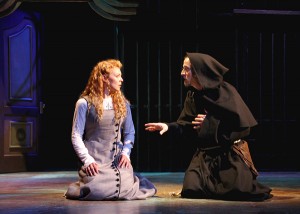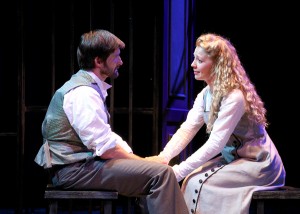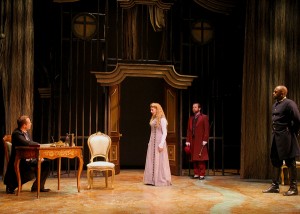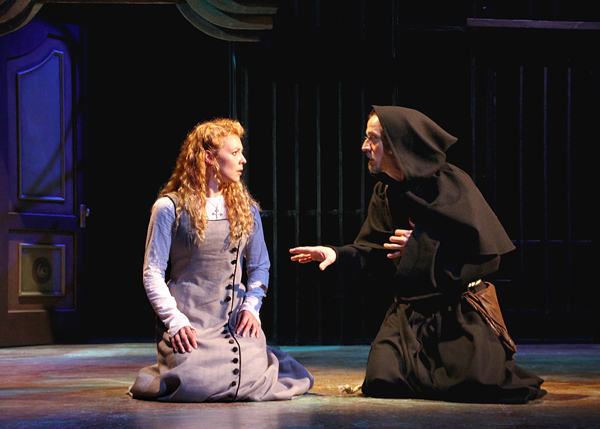
Erin Partin and Bruce Turk in MEASURE FOR MEASURE at Shakespeare Theatre of New Jersey. (Photo © Gerry Goodstein)
Sophocles’ ANTIGONE is often held up as the quintessential play about the moral conundrum, but Shakespeare’s MEASURE FOR MEASURE has a thing or two to say about moral ambiguity as well, and belongs properly in the company of those plays that challenge us most to navigate gray areas of uncertainty. Although The Shakespeare Theatre of New Jersey’s fire alarm may have had some opening night jitters, the production as a whole shows a steady, if occasionally plodding, hand in embracing Shakespeare’s opacity, wisely resisting the temptation to impose pat solutions to complex questions.
MEASURE FOR MEASURE opens as Vienna’s Duke Vincentio, weary of governance and dissatisfied with his performance, takes a leave of absence, appointing all his duties and powers to Angelo as deputy in his stead. Vincentio fears his leniency has let the laws of Vienna slip too far, and he is confident that Angelo’s natural strictness will set them aright with a tyranny Vincentio fears to yield himself. But he wants to watch: spreading the rumor that he is traveling abroad, Vincentio disguises himself as a friar so he can witness Angelo’s virtue sweep Vienna clean of its depravity.
Angelo wastes no time in enforcing the purity of moral virtue he sees in himself throughout the city. After ordering Vienna’s brothel’s shuttered, he immediately condemns young Claudio to death for having impregnated Juliet, to whom he is betrothed, but not yet married. Claudio’s friends, aghast at such draconian rule unknown in Vienna, send to his sister, Isabella, who is on the verge of entering a convent, to make an appeal to Angelo on her brother’s behalf. Upon meeting with Isabella, Angelo’s supposed virtue shows its human weakness as he offers to acquit Claudio if Isabella would yield Angelo her chastity. Tension builds as Claudio’s time of execution draws closer, and all but Angelo hope to see him saved, though only Isabella seems to have the means of salvation, however unthinkable they are to her soon-to-be-cloistered mind and body. Disguised, Vincentio finds himself pitying Claudio’s cause, and propels much of the play’s action by conspiring with Isabella and others to save the condemned.

James Knight and Erin Partin in a scene from Shakespeare Theatre of New Jersey’s MEASURE FOR MEASURE. (Photo: © Gerry Goodstein)
Fitting neither the mold of Shakespearean comedy nor tragedy, MEASURE FOR MEASURE is often saddled with the classifier “Problem Play,” which seems to break down roughly into: “This play is a problem for us latter-day scholars because it does not fit neatly enough into our falsely constructed and ill-fitting generic classifications.” Those who so often endeavor to explain Shakespeare by a formulaic genre calculus are regularly undone by the playwright himself, and perhaps most of all by MEASURE FOR MEASURE. It is a play bound up in contradiction and ambiguity, and although it is regularly funny, its ending stoutly denies the closure expected of comedy.
The Shakespeare Theatre of New Jersey’s artistic director Bonnie J. Monte helms this production with a steady comfort in its genre defiance. The comedy (especially the wonderful scene stealing of Greg Jackson’s Lucio and the perfect creepiness of Darren Matthias’s demented executioner) hits its mark, but there is no evidence of attempts to smooth the play’s rough edges. MEASURE FOR MEASURE deals unabashedly with the complications of justice, and it would be folly to shun that complexity. As Vincentio learns while in disguise, the apparent comfort of black and white notions of right and wrong can run counter to everyday life’s tendency to confound our strongest urges for simplicity.
Wise though Monte’s direction is in its dramaturgy, its sense of pace could use a boost of energy. In contrast to the smooth briskness of The Shakespeare Theatre’s recent HENRY IV, PART ONE, this production ambles along with a leisure that can grate, especially in scene changes. The result is a tedium that culminates in the long final scene testing the patience of an audience waiting as the Duke meticulously reveals the many layers of his schemes that we already know in full. The power of dramatic irony can fuel a production only so far.

Sean Mahan, Erin Partin, Greg Jackson, and Lindsay Smiling in MEASURE FOR MEASURE at Shakespeare Theatre of New Jersey. (Photo: © Gerry Goodstein)
This labored pace reveals itself at places in the acting, but strong performances nonetheless exist throughout. Spending most of the play in Vincentio’s friar disguise, Bruce Turk nicely shows us the character evolving from his incredulous confidence in Angelo at the play’s opening to a wiser Duke who comes to recognize the complexities of justice. Turk and Erin Partin’s Isabella give a lasting final glimpse of the production as the play’s famous ending casts doubt on the Duke’s new insightfulness. As Angelo, Sean Mahan seizes eagerly the opportunity to play the pompous heel at whom we all love to sneer. Few people are more directly the object of Shakespeare’s mockery than the puritanical, and like TWELFTH NIGHT’s Malvolio, Angelo ultimately pays dearly for his smug virtue. But Mahan is sure to reserve a sense of humanity for Angelo: in his performance we are able to recognize the struggles with desire and other natural weaknesses that the character is so resolute in suppressing.
MEASURE FOR MEASURE can be a test of a director’s mettle: to impose closure or embrace complexity? Monte and The Shakespeare Theatre of New Jersey show here that they are unafraid to deny their audience simple answers and to leave us instead to wrestle questions of moral ambiguity on our own.
MEASURE FOR MEASURE
Written by William Shakespeare
Directed by Bonnie J. Monte
August 8 – August 26, 2012
The Shakespeare Theatre of New Jersey
36 Madison Avenue
Madison NJ, 07940
973-408-5600
www.ShakespeareNJ.org


